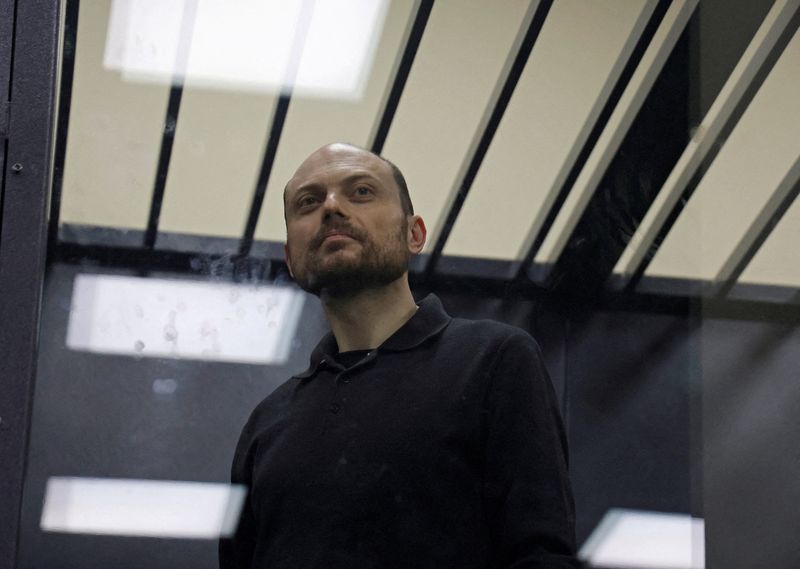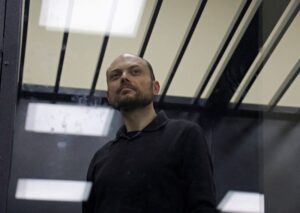Location of another jailed dissident in Russia unclear ahead of possible prisoner swap with West

By Andrew Osborn, Filipp Lebedev and Lucy Papachristou
MOSCOW (Reuters) – A lawyer for Vladimir Kara-Murza, a Russian-British dual national convicted of treason, has been unable to see his client in jail for two days, he said on Wednesday, the latest sign that a prisoner swap with the West may be close.
The Kremlin has declined to say whether an exchange is looming. But Kara-Murza is at least the eighth jailed Russian dissident to have disappeared from view in three days. Others have been unexpectedly moved from their prisons.
In another possible harbinger of a swap, Olga Karlova, a lawyer for Paul Whelan, a former U.S. marine serving 16 years in Russia on espionage charges he denies, said she could not confirm his whereabouts.
Washington has been demanding his release since his arrest in 2018.
Ivan Pavlov, a prominent Russian human rights lawyer now living in Prague, said the disappearance of so many people with similar profiles suggested the authorities were gathering them, probably in Moscow, for an exchange.
He said this could happen “within days” once President Vladimir Putin had pardoned those involved, a necessary formality.
In December 2022, Russia traded basketball star Brittney Griner, sentenced to nine years for having vape cartridges containing cannabis oil in her luggage, for arms dealer Viktor Bout, serving a 25-year sentence in the U.S.
The biggest prisoner swap since the Cold War took place in 2010, involving 14 people in total.
Other dissidents whose supporters say they have been told that they have been suddenly moved are opposition politician Ilya Yashin, human rights activist Oleg Orlov and Daniil Krinari, convicted of secretly cooperating with foreign governments.
Others to have abruptly gone missing in the prison system include German-Russian citizen Kevin Lik, convicted of treason, opposition activists Liliya Chanysheva and Ksenia Fadeeva, and anti-war artist Sasha Skochilenko.
WEST SEES DETAINEES AS POLITICAL PRISONERS
In the West, they are seen by governments and activists as wrongfully detained political prisoners. All have, for different reasons, been designated by Moscow as dangerous extremists.
On July 19, U.S. journalist Evan Gershkovich was convicted unusually swiftly on espionage charges that he denies. He was handed 16 years in jail and Russia has already confirmed talks about his possible exchange.
Alsu Kurmasheva, a Russian-American journalist for U.S.-funded Radio Free Europe/Radio Liberty, was also convicted in unusual haste in a secret trial the same day and sentenced to 6-1/2 years, accused of spreading false information about the Russian army. She denies wrongdoing.
Other U.S. nationals behind bars in Russia include former schoolteacher Marc Fogel, convicted for possessing marijuana, which he said he used for medical reasons.
In Belarus, meanwhile, President Alexander Lukashenko, a close Putin ally, on Tuesday pardoned Rico Krieger, a German sentenced to death on terrorism charges, again with unusual haste and state media coverage.
Among those Moscow has signalled it wants is Vadim Krasikov, a Russian serving life in Germany for murdering a former Chechen militant – an exchange that would probably require Berlin to get someone considered broadly equivalent in return.

The U.S. is holding at least two Russian nationals, Vladimir Dunaev and Roman Seleznev, convicted of serious cybercrimes, who could also figure.
A Slovenian court on Wednesday sentenced two Russians to time served for espionage and using fake identities, and said they would be deported, the state news agency STA reported.





